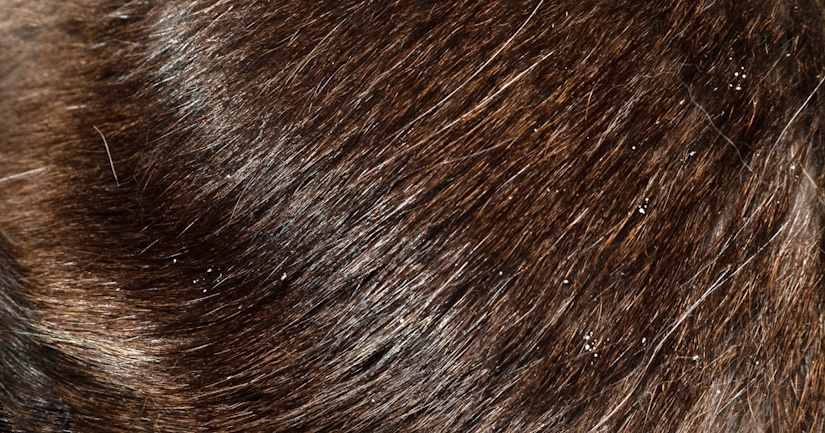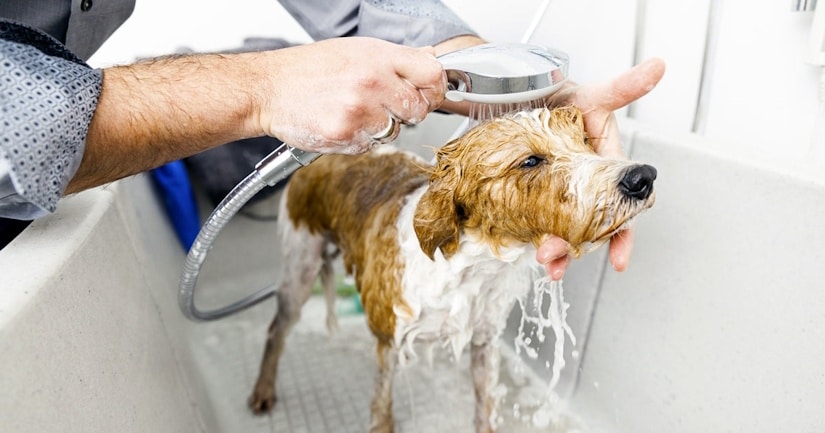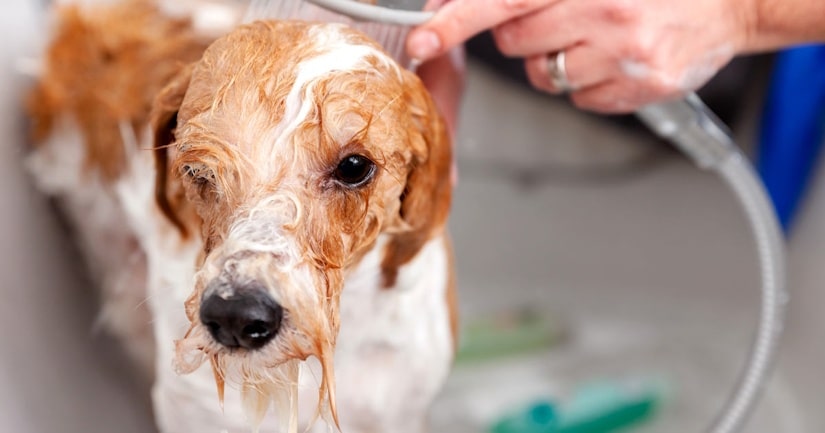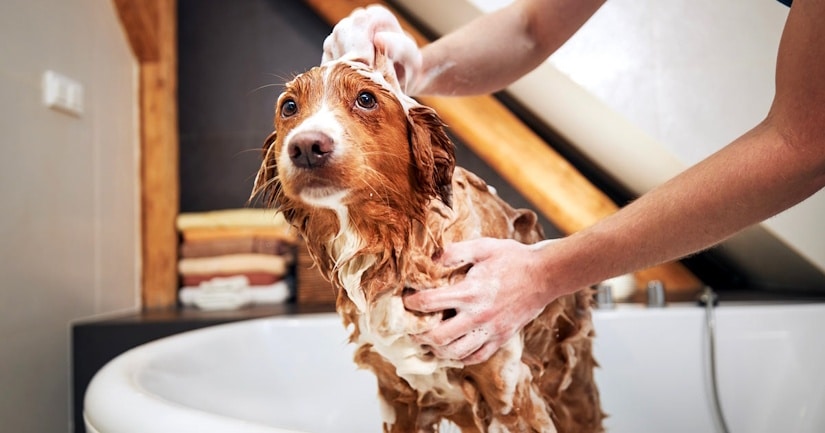Choosing the right shampoo for your dog is essential for maintaining their overall health and well-being.
However, it can be overwhelming to find a safe and effective shampoo. There are literally thousands of dog shampoos on the market – how can you tell which is best for your pet?
In this article, we’ll share 10 tips to help you choose the best shampoo for your canine companion.
1. Understand Your Dog’s Skin
Just like humans, dogs have different skin types, such as sensitive, dry and oily. Choosing the right shampoo can help maintain your dog’s coat and keep their skin healthy.
To determine your dog’s skin type, observe their coat and skin. Three common issues that you might notice include:
- If your dog’s skin appears red, irritated, or frequently itchy, they might have sensitive skin.
- If your dog’s coat is dull or there’s an excessive amount of dandruff, they might have dry skin.
- If you notice a greasy residue or a strong odor emanating from your dog, they might have oily skin (also known as oily seborrhoea).
Understanding your dog’s skin type is crucial when selecting a shampoo because different skin types have different needs.
For example, a dog with sensitive skin may require a gentle, hypoallergenic shampoo, while a dog with dry skin would benefit from a moisturizing shampoo containing natural oils like oatmeal or aloe vera.
Keep an eye out for other issues, such as fleas and ticks. A regular shampoo may not be enough to combat these parasites, so a specialised shampoo could be required.
2. Consider Your Dog’s Coat Type

When choosing a safe shampoo for your dog, it’s also crucial to consider their coat type. Some shampoos are formulated for particular types of fur.
For example, if your dog has long, silky fur, opt for shampoos specifically designed to enhance those coat properties. On the other hand, if your dog has a double coat that evolved to handle winter weather, choose a product that can effectively penetrate both layers.
3. Choose a Dog Shampoo With Natural Ingredients
When selecting a shampoo for your dog, it’s a good idea to look for products with natural ingredients. Natural ingredients aren’t always healthier for a dog, but synthetic ingredients are more likely to be harsh on your pet’s skin.
Two of the most beneficial natural ingredients in dog shampoos include aloe vera and oatmeal. Aloe vera is known for its soothing and anti-inflammatory properties, which can relieve itching and irritation. Oatmeal is also gentle on the skin and can provide much-needed relief to dogs with sensitive or itchy skin.
Keep in mind that dogs may be allergic to certain natural ingredients. Always perform a patch test on a small area of your dog’s skin before using a new shampoo. If you notice any redness, swelling, or itching after the patch test, discontinue use and consult your veterinarian.
4. Avoid Harsh Chemicals in Your Dog’s Shampoo
Choosing a safe shampoo for your dog means being vigilant about the ingredients you’re exposing them to. Many dog shampoos on the market contain harsh chemicals, like parabens and sulfates, which can be detrimental to your pup’s health. These chemicals are often used as preservatives and foaming agents, but they can cause irritation and damage to your dog’s skin.
For example, parabens may cause hormonal disruptions, while sulfates strip natural oils from your dog’s coat. The good news is that more companies are offering dog shampoos free of these harmful chemicals.
To make sure you’re choosing the best shampoo for your dog, take the time to read and understand the ingredients list. Keep an eye out for any potential allergens or irritants, especially if your dog has sensitive skin.
5. The Importance of pH Balanced Dog Shampoos

Your dog’s skin has a different pH level than human skin, so it’s essential to choose a shampoo formulated specifically for canines. Dogs typically have a pH of 6.5-7.5, whereas humans have a lower skin pH of 5.2 to 6.2.
A pH-balanced dog shampoo helps maintain the natural acidity of your dog’s skin, keeping it healthy and preventing issues.
Using a shampoo with the wrong pH can damage your dog’s skin by disrupting its natural barrier. This can lead to irritation, dryness, and even infections. To ensure your dog’s skin stays healthy, it’s crucial to use a shampoo designed with their pH levels in mind.
When selecting a dog shampoo, look for a shampoo with a pH level between 7.0 and 7.5. Avoid using human shampoos on your dog, as they typically have a lower pH of around 4.5 to 5.5, which can be too harsh for your furry friend.
6. Look for Unscented Dog Shampoos
Dogs have a highly sensitive sense of smell, and many scents can irritate their noses.
For this reason, unscented or mild shampoos are an excellent choice, because they are less likely to cause any discomfort for your dog. Unscented shampoos also often contain fewer chemicals and potentially harmful ingredients, such as synthetic fragrances. This means they are generally safer for your dog’s skin and fur, reducing the risk of allergic reactions or sensitivities.
7. Monitor Your Dog Closely After Using a New Shampoo
Choosing a dog-specific, unscented, and pH balanced shampoo reduces the chance of your dog suffering from an allergic reaction. But there is still always a chance that your dog will respond negatively to a new product.
For this reason, you should always watch your dog for symptoms of an allergic reaction or skin irritation after using a shampoo for the first time. Some warning signs to look out for include:
- Itchiness
- Hives
- Increased licking or scratching
- Head shaking
- Rashes
- Swelling or ulcers on the skin
- Whimpering or vocalisations
As we mentioned earlier, it’s also a good idea to perform a patch test when using a new shampoo. This means shampooing a small area of skin, to minimise a potential reaction.
8. Avoid Human Shampoos
It’s common for dog owners to consider using human shampoo on their dog. However, you should never use anything other than specially-formulated dog shampoo on your pet, as other types could have negative consequences for your dog’s skin health.
As we’ve already mentioned, dog shampoos are specifically designed for the pH levels of canine skin. They are formulated to be gentle on a dog’s hair and skin biology, while not containing any ingredients that might be unsafe. In contrast, human shampoos are likely to cause dryness, irritation, and redness.
This is true for both standard and anti-dandruff human shampoos. As The Dog Clinic notes, even moisturising shampoos such as Head and Shoulders should be avoided when bathing a dog, as they can cause skin issues over time.
9. Consult With a Professional
There are some situations where it’s important to ask a professional about your dog’s shampoo.
For example, if your dog suffers from a skin condition, then a vet may decide to prescribe a medicated shampoo. This is particularly important for dogs with chronic allergies or acute skin conditions.
Never try to treat a skin condition with shampoo before consulting with your vet. As a 2014 study in Veterinaria notes, “medicated shampoos are specific for different skin conditions: there are antimicrobial, antiparasitic, antiseborrhoeic, antipruritic and emollient/hydrating shampoos.” In other words, the correct treatment relies on getting an accurate diagnosis, which is why a vet checkup is essential.
Even if your dog doesn’t have a skin condition, it might worth talking to a dog groomer about shampoo options. Groomers have lots of experience choosing the right products for a variety of different types of coat.
10. Choose a Trusted Brand
There is little regulation when it comes to dog shampoos. So, it’s usually a good idea to stick with trusted and well-known brands, as they are often safer and higher-quality.
This is another reason why discussing shampoo choice with your dog’s vet and groomer is a good idea. If professionals trust and recommend a certain brand, then you can feel safer using it on your pet.

Summary
Choosing a dog shampoo isn’t just about cleanliness—it’s about your pet’s health. Consider their skin type, potential skin issues, and the shampoo ingredients. Natural components and correct pH balance are also essential. However, remember every dog is unique, so what works for one might not for another.
In cases of severe skin conditions or allergies, always consult with a vet. Their advice can save time and ensure your dog’s comfort and health.
